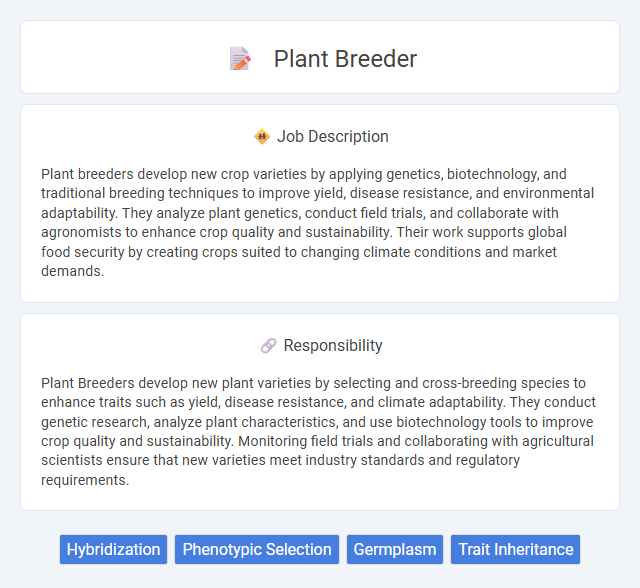
Plant breeders develop new crop varieties by applying genetics, biotechnology, and traditional breeding techniques to improve yield, disease resistance, and environmental adaptability. They analyze plant genetics, conduct field trials, and collaborate with agronomists to enhance crop quality and sustainability. Their work supports global food security by creating crops suited to changing climate conditions and market demands.
Individuals with strong analytical skills and a passion for plant science are likely to thrive as plant breeders. Those comfortable working in laboratory and field environments under varying weather conditions may find this career suitable. Candidates who enjoy problem-solving and continuous learning probably have a higher chance of success in this role.
Qualification
Plant Breeders typically require a Bachelor's degree in Agronomy, Plant Science, Genetics, or a related field, with many employers preferring candidates who hold a Master's or Ph.D. in Plant Breeding or Crop Science. Strong knowledge of genetics, biotechnology, and data analysis is essential, as well as experience with breeding techniques including hybridization and molecular markers. Practical skills in field trials, laboratory research, and proficiency in bioinformatics tools enhance a Plant Breeder's ability to develop improved crop varieties.
Responsibility
Plant Breeders develop new plant varieties by selecting and cross-breeding species to enhance traits such as yield, disease resistance, and climate adaptability. They conduct genetic research, analyze plant characteristics, and use biotechnology tools to improve crop quality and sustainability. Monitoring field trials and collaborating with agricultural scientists ensure that new varieties meet industry standards and regulatory requirements.
Benefit
A Plant Breeder job likely offers the benefit of contributing to sustainable agriculture through the development of improved crop varieties. There is a probability of gaining expertise in genetics and biotechnology while addressing food security challenges. This role may also provide opportunities for collaboration with agricultural researchers and industry professionals, enhancing career growth.
Challenge
Plant breeders probably face significant challenges in developing new crop varieties that can withstand climate change, pests, and diseases. The complexity of genetic traits and environmental factors makes predicting outcomes difficult, requiring continuous experimentation and adaptation. High demands for sustainable and high-yield crops increase the pressure on plant breeders to innovate quickly while ensuring safety and efficacy.
Career Advancement
Plant Breeders develop new crop varieties by applying genetics and biotechnology to improve yield, resistance, and quality. Career advancement often involves progressing from research roles to lead breeder positions, project management, or roles in agribusiness companies overseeing varietal development. Expertise in molecular techniques and data analysis enhances opportunities for leadership and innovation in commercial and academic settings.
Key Terms
Hybridization
Plant breeders specializing in hybridization develop new plant varieties by crossing different species or strains to combine desirable traits such as disease resistance, yield, and environmental adaptability. They utilize techniques like controlled pollination, genetic selection, and molecular markers to enhance hybrid vigor and ensure stable expression of target characteristics. Advanced knowledge in genetics, plant physiology, and biotechnology is essential for successful hybrid cultivar development in crops like maize, rice, and wheat.
Phenotypic Selection
Plant breeders utilize phenotypic selection to identify and propagate plants with desirable traits such as disease resistance, yield, and environmental adaptability. This method relies on observable characteristics, enabling breeders to select superior plants based on morphologic and physiological features without immediate genetic analysis. Phenotypic selection accelerates crop improvement by combining field evaluation with precise trait measurement, enhancing agricultural productivity and sustainability.
Germplasm
Plant breeders specializing in germplasm focus on the identification, collection, and preservation of genetic material to develop new crop varieties with improved traits such as disease resistance, yield, and environmental adaptability. They utilize advanced techniques such as molecular markers and genome editing to enhance the genetic diversity and quality of germplasm resources. Their work supports sustainable agriculture by ensuring a robust gene pool for future breeding programs and food security.
Trait Inheritance
Plant Breeders specialize in trait inheritance to develop crop varieties with improved characteristics such as disease resistance, drought tolerance, and higher yields. They analyze genetic markers and utilize advanced breeding techniques like marker-assisted selection to predict and transfer desirable traits across generations. Understanding Mendelian genetics and genome editing tools enables Plant Breeders to accelerate the development of superior cultivars tailored to specific environmental conditions.
 kuljobs.com
kuljobs.com